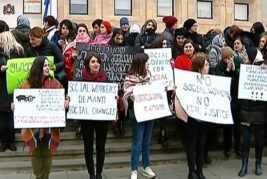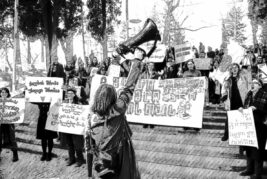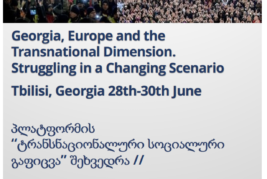
Translations: Deutsch – Español – Français – Italiano – Polskie – Português – ελληνικά –русский
Austerity is now the new normality in Europe. In these years monetary policies have been used to enforce neo-liberal labour reforms, privatization of the commons, cuts in welfare benefits and less civil rights. European governments and financial institutions use debt and technical parameters as a political tool to play workers and populations against each other, as the blackmail against Greece has shown. A new government of mobility is creating hierarchies among, between and inside European regions and is trying to limit the movements of migrants from inside and outside the EU. The global chains of production and of care-work criss-cross the European space using the different wage regimes and labour legislations for the sake of profits, creating a deep gap between the few rich and many poor. Through outsourcing and subcontracting the strength and the power of strike action is challenged.
The many existing struggles throughout Europe on wages, housing, welfare and freedom of movement are confronting, from different sides, the current attack on life and working conditions. Faced with the transnational dimension of these attack, it becomes apparent the need to overcome their isolation and to find common priorities. The new forms of mutualism and local self-organization which have developed since the crisis are confronted with the problem of enlargement and inability to communicate with other struggles on wage and working/living conditions. The capitalist divisions between permanent workers, temps and unemployed, migrants and locals, formal and informal sectors create obstacles to the organization of successful struggles inside and outside the workplaces, throughout all of society. While Trade Unions, associations and movements center their activity within a national context, the transnational dimension of the European government of mobility and labor requires the capacity to build a power on the same scale of the attacks deployed.
In front of this situation, we want to build up a process for a transnational social strike that could create connections, organization, transnational communication and strengthen common bonds between social and labor struggles. The transnational social strike starts from the limits of traditional forms of social and labor struggles and the form of trade union organization, from the loss of power that the strike, even when general, has experienced due to precarization and the transnational dimension of production. The strike is the name of a practice and of a process of organization, that entails the need to bring labor (in all its current forms) back in the agenda of the social movements. At the same time, the question is how to make the transnational social strike a process of organization able to widen the scale of existing insubordination and produce new and more powerful struggles, inside and outside the workplaces.
After the assembly held in Frankfurt on March 19th 2015, we want to take a step forward and meet in Poznan, Poland on the 2nd-4th October 2015. The meeting place in Poznan offers the opportunity to foster the participation from the Eastern countries of Europe that are at the center of the present regime of exploitation and to promote a deeper exchange among labor and social struggles across established borders and regions. In three days of panels, assemblies and workshops we want to keep focus on the singular situations, sharing experiences and tactics, and on how to build a political perspective able to become a reference point for the existing struggles as well as new ones to come. Some focuses for our discussions are: how do we organize resistances and claims in front of the transnational organization of production? How do we share common knowledge of the different conditions? How do we strike where the borders between the inside and the outside of the workplaces are blurring? Are the claims on European minimum wage, income, welfare and minimum residency permit for migrants able to work as tools of transnational organization and of connection between the already existing struggles in different cities and countries of Europe and beyond? How do we organize collectively against the fragmentation and individualization of labor? How to create connections between permanent and temporary workers? How to tackle the social conditions of exploitation?
Everyone who is interested in building this process and in contributing to its organization is very welcome to participate in the meeting.




